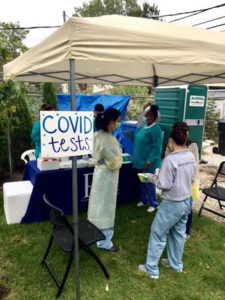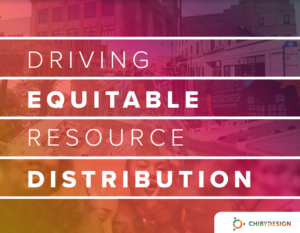By: Alicia Plomin, Marketing & Development Manager at Austin Coming Together
Originally published in 12/1/21 issues of Austin Weekly News and Wednesday Journal newspapers
Although COVID-19 brought tragedy, it also provided the opportunity for a level of collaboration that has never happened before.
The pandemic showed it was possible for emergency support and resources to quickly and equitably be distributed. The needs of individuals and communities became the driver of funds, and approval processes were often bypassed. We also saw long-standing inequities be revealed as the reason Black and Brown communities like Austin were most impacted by the crisis.
CHICAGO’S TARGETED APPROACH
To start addressing those racial disparities, Chicago Mayor Lori E. Lightfoot formed the Racial Equity Rapid Response Team (RERRT) in the Spring of 2020 composed of city leadership, healthcare institutions, and organizations representing the communities hit hardest by COVID-19, including Austin Coming Together (ACT). This cross-sector collaborative identified acute challenges in these communities and co-designed interventions including food and PPE distributions, and later testing and vaccination sites.
In parallel with this immediate response work, the RERRT also sought to identify ways to ultimately eliminate racialized economic discrimination and exclusion. With this in mind, they created the Resource Working Group to create solutions to equitably shift existing resources and thoughtfully align future investments to support those most adversely affected by historic inequities.
COMMUNITY PARTICIPATION CREATES OWNERSHIP
West Side United and several community anchor organizations, including ACT, make up the Resource Working Group. The group engaged the firm ChiByDesign to facilitate workshops to gather the collective knowledge of business, government, intermediaries, nonprofits, philanthropy, and, most importantly, community residents to unearth the unfair experiences of Black and Brown residents and how actions or lack of actions by institutions affect them. Through this process, they were able to better understand the connection between injustices and the policies, practices, and infrastructure that influence or enable them.
This research is currently being used to create a report on Driving Equitable Resource Distribution that will include a community-developed framework to energize and amplify equity-driven cross-sector collaboration.
We are at a critical moment in history. We are using language meant to shift power and systems, but haven’t changed our mindsets, approaches, practices and power hoarding ways.” — Angelique Power, an advocate who was critical in securing the support needed to create a report on Driving Equitable Resource Distribution.
West Side United was launched in 2018 and brought a model prioritizing community involvement to their work with the RERRT and the Resource Working Group. As a collaborative of health care institutions, residents, educators, non-profits, businesses, government agencies, and faith-based entities, West Side United acts as a conduit for supporting neighborhoods to become stronger, healthier and more vibrant places to live.
Speaking of the RERRT’s efforts, “There’s never been a table set like this before where the Mayor’s office is reaching out to community leaders to help create solutions,” said Tenisha Jones, Senior Director for Strategy and Operations at West Side United.
STARTING TO REPAIR AND RESTORE
Historically businesses, government, and philanthropy have been siloed in their efforts to help residents. That’s why it was critical to the Resource Working Group to involve all sectors of the community in the research stage and especially in collaborative strategy development. Almost half of those who participated in ChiByDesign’s workshops were community stakeholders, and those representing Austin were all part of the Austin Forward. Together. (AFT) quality-of-life plan, an award-winning collaborative effort between more than 40 local leaders and over 40 unique implementation partner organizations.
The momentum, innovative thinking, and cross-sector conversation that these projects produced must be continued and leveraged.
The voice of the community has to be considered equally as important as other resources. This, and other lessons learned, should inform intentional and targeted strategic investments and resource redistribution focused on and determined by historically disadvantaged communities.
ACT is committed to its work with the RERRT and to further discussions on how best to ensure tools like the upcoming report can be used to restore trust and repair the harm caused by inequities.
CHALLENGES TO ACHIEVING RACIAL EQUITY
The report on Driving Equitable Resource Distribution highlights some of the issues that will need to be addressed in Chicago and nationally in order to truly advance racial equity for Black and Brown communities:
-
- There are no standardized criteria to measure the success of equity-focused initiatives and programs.
- While legislation and governmental policy directly addressing racial inequities are cited as a needed solution, they aren’t being passed.
- Communities of color aren’t aware of many of the supports and resources available to them.
- Communication strategies aren’t culturally responsive or sent through the most commonly used mediums.
- Policies aimed at protecting people of color aren’t being enforced.
- Holistically addressing racial inequities requires multifaceted interventions and investment.
- Multi-issue approaches will require greater collaboration across business, philanthropy, and government.
- The ever-widening racial wealth gap shows that more resources are key to generating financial security, freedom, and intergenerational wealth.
- Of all the initiatives to advance racial equity in Chicago, none include a plan to address racial housing segregation.
A CALL TO ACTION
Decades of racist and discriminatory policies and practices have led to systemic divestment and disenfranchisement within Black and Brown communities. The effects have limited these residents’ access to information, capital, and other essential resources.
To address structural inequities, there must be:
-
- Continued collaboration
- The persistence of pandemic-initiated innovations
- The creation of new processes centered around the groups that continue to be most affected by racism and discrimination
 Get notified when the Report is published! Complete the form at the bottom of our website to get ACT’s emails.
Get notified when the Report is published! Complete the form at the bottom of our website to get ACT’s emails.
Read more about what’s happening in Austin:
- 2021 Highlights from the ‘Austin Forward. Together.’ quality-of-life plan (published December 2021)
- Recentering equity (published December 2021)
- Bringing Austin’s vision to life: How the community is leading its own change (published in October 2021)
- Two new developments will support youth goals of the ‘Austin Forward. Together.’ quality-of-life plan (published in October 2021)
- Austin’s path to revitalization (published in July 2021)
- Leading to this moment in Austin: A timeline (published in July 2021)
- ‘A path to health equity’ by Darnell Shields, ACT Executive Director (published in April 2021)
- ACT awards over $184k to support AFT plan implementation year three (published in April 2021)
- Food apartheid: How Austin is recreating its food ecosystem through the Austin Eats Initiative (published in April 2021)
- ACT’s COVID-19 recovery efforts
- ‘An unwavering commitment’ by Darnell Shields, ACT Executive Director (published in Dec 2020)
- Distanced and disconnected: How COVID-19 has widened the digital divide and how ACT is working to address it (published in Dec 2020)
- An introduction to Austin’s quality-of-life plan called ‘Austin Forward. Together.’ (AFT)
- The ASPIRE Initiative set of development projects near Madison and Central in Austin


